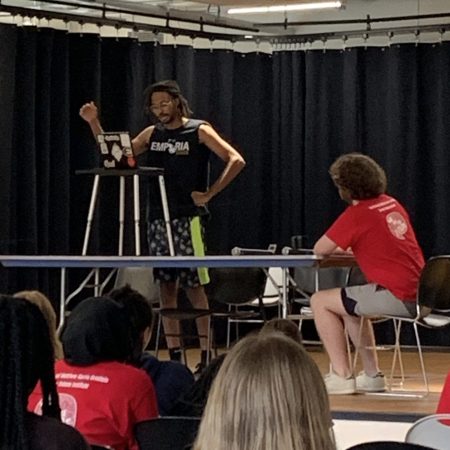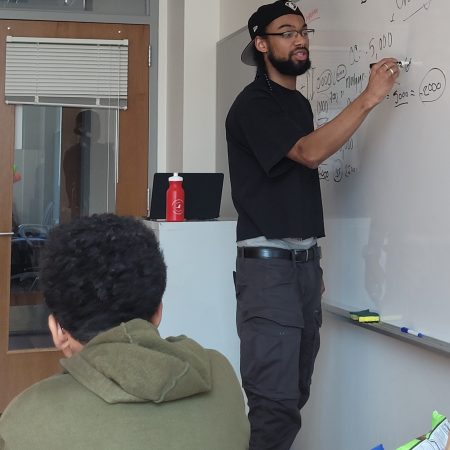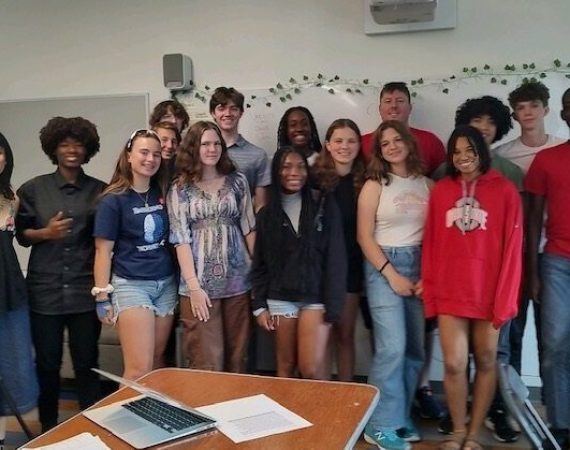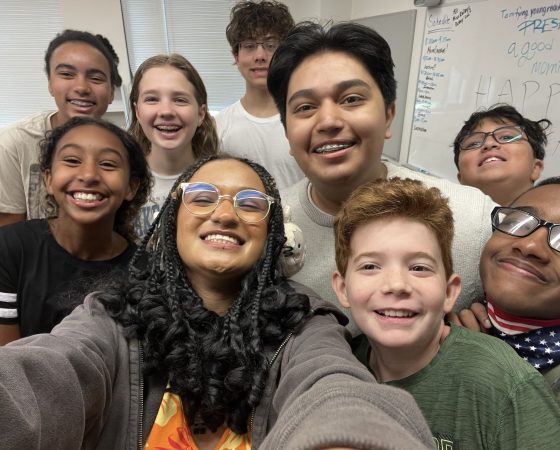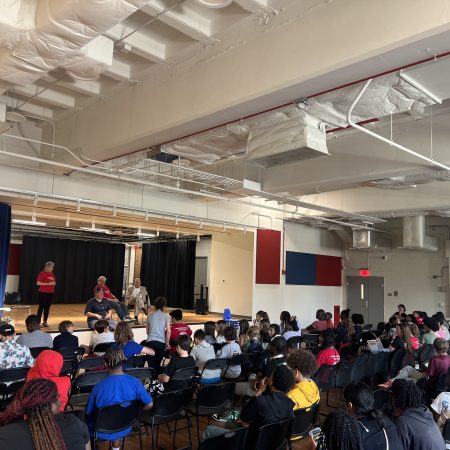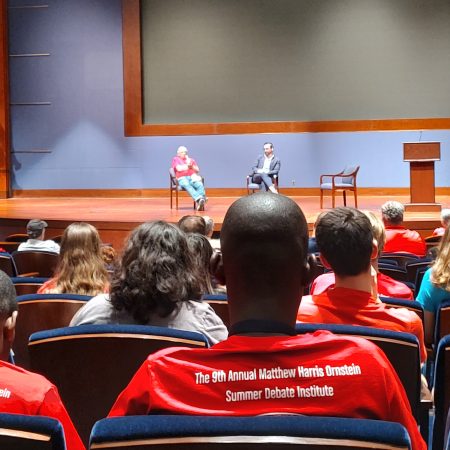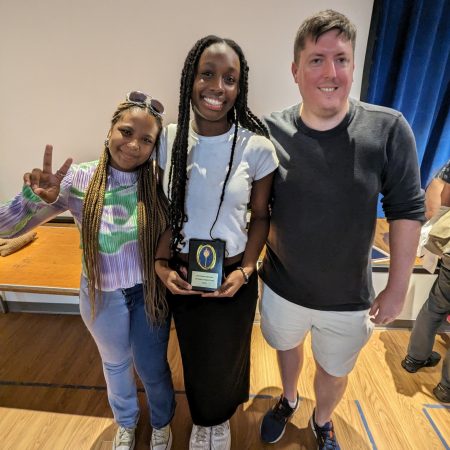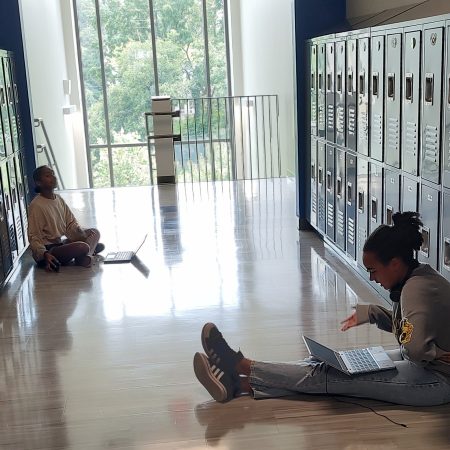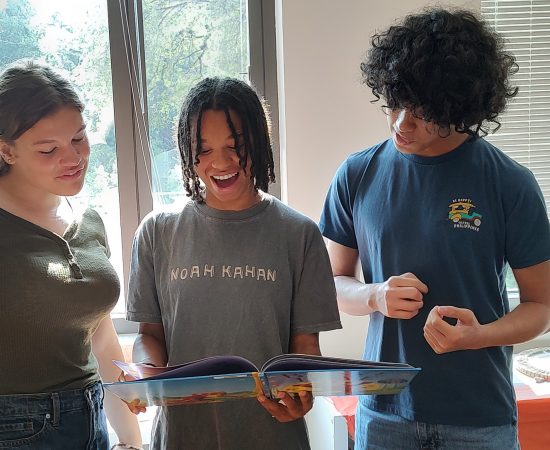
9th Annual Matthew Harris Ornstein Summer Debate Institute
The Washington Urban Debate League started at the Matthew Harris Ornstein Summer Debate Institute 9 years ago. Starting with 32 students for a single week, we’ve come a long way.
This year’s 3 week, 150 student institute was hosted at DC Bilingual, a nod to our expanded partnerships and programming in elementary schools.
This year’s 3 week, 150 student institute was hosted at DC Bilingual, a nod to our expanded partnerships and programming in elementary schools.
Many thanks to DC Bilingual for being a wonderful host. Their new wing (and the rest of the building) was beautiful and well maintained, and the administrative team of Christian and Eddie was easy to work with. The school was easily accessible to transit so students could easily attend, and had great outdoor spaces for our water balloon fight (see below)!
This year, the relevance of the national topic generated substantial enthusiasm before we even got started.
The United States federal government should substantially increase fiscal redistribution in the United States by adopting a federal jobs guarantee, expanding Social Security, and/or providing a basic income.
That being said, this resolution posed some unique pedagogical challenges — economics isn’t usually taught in high schools anymore, except as an elective or AP course, and most of our debaters are too young to have taken it anyway. We couldn’t have done it without a star studded array of guest speakers, including:
- Congresswoman Rosa DeLauro (D-CT)
- LesLeigh Ford, Associate Director, Urban Institute
- Kellen Grode, Labor Economist, US Dept. of Labor
- David John, Senior Policy Advisor, AARP, and Non-Resident Senior Fellow and Deputy Director of the Retirement Security Project, Brookings Institution
- Arjun Krishnaswami, Senior Policy Advisor for Clean Energy Infrastructure, White House
- Gene Ludwig, former Comptroller of the Currency (Clinton Administration), Ludwig Institute for Economic Prosperity
- Natasha Murphy, Director of Health Policy, Center for American Progress
- Edwith Theogene, Senior Director, Racial Equity and Justice, Center For American Progress
What was new this year?
We’re always trying new things, testing ideas from coaches, students, staff, and alumni and looking for the best balance of activities to fit that year’s topic.
1. Literacy Interventions in Novice
Making debate accessible is at the core of what we do. Pedagogically, there is always more work to be done on this front, but we took some big, concrete steps in this direction. Driven by some amazing feedback from the Librarian at Eliot Hine, one of our partner schools, Ashleigh Rose, we’ve made two big adjustments that we think will help students who aren’t strong readers better access debate materials, and increase their retention.
A) Less Jargon
Debate can have a bit of its own language, and most of it isn’t necessary at all. We’ve cut through the noise and eliminated most of the new terms that students need to learn.
B) Visual Adjustments
We still call evidence “cards,” a reference to pre-digital debate, where photo copies from books and newspapers were taped to index cards. The way we present evidence was equally antiquated, actively in contrast with best practices on teaching people to read. Underlines, 6 point font, and complex, unexplained citations are out, and visually appealing and clearly labeled information is in! New AI tools allowed us to put all the sample cases for Rookie and Novice through lexile tests to ensure the evidence was accessible for middle school readers, without dumbing down the subjects they’re discussing.
A) Less Jargon
Debate can have a bit of its own language, and most of it isn’t necessary at all. We’ve cut through the noise and eliminated most of the new terms that students need to learn.
B) Visual Adjustments
We still call evidence “cards,” a reference to pre-digital debate, where photo copies from books and newspapers were taped to index cards. The way we present evidence was equally antiquated, actively in contrast with best practices on teaching people to read. Underlines, 6 point font, and complex, unexplained citations are out, and visually appealing and clearly labeled information is in! New AI tools allowed us to put all the sample cases for Rookie and Novice through lexile tests to ensure the evidence was accessible for middle school readers, without dumbing down the subjects they’re discussing.
While both interventions are still a work in progress, the early feedback was very positive, building off some great work in Minnesota and LA on improving the accessibility of their core teaching materials.
2. Structural Adjustments in Varsity
WUDL Director David Trigaux returned to the classroom this summer to help implement some structural changes in how we teach Varsity students. Outlined on the bus back from many travel tournaments this past year in conversation with alumni Zara Escobar, Paris Smalley, and others, this was a huge opportunity to challenge a young Varsity lab to think differently.
David and Zara co-taught the lab, which focused during the first week on the fundamentals such as persuasion techniques beyond the intro Ethos, Pathos, and Logos discussion everyone gets as a novice, and how to quickly assimilate new ideas and arguments. We walked through what a debate is, why we do a lot of the things we do, and what the theories of power are that underpin all of the arguments that we make.
In Week 2, we focused on content knowledge, with in depth discussions on economics, politics, populism, ableism, capitalism, and a host of other areas. In Week 3, we focused on execution, with even more speech re-dos, practice rounds, and opportunities to judge the less experienced debaters.
3. Mental Health Pivot:
The Matthew Harris Ornstein Memorial Foundation is primarily an advocacy organization for better public policy around mental health challenges, and the Institute has always included mental health elements. During COVID, these programs focused on coping with a challenging environment.
This year, we brought in Brian Yu, a sports psychologist, to discuss the competitive pressures students might face, and to help young people be in their best mental space to perform when debating.
4. Equity and Inclusion Focus:
Debate is a space where we argue against people’s ideas, not their person. In an era of toxic social media algorithms and increased hostility in the national discourse, we added an array of electives for students to choose from centering equity and inclusion. These topics, taught by our staff, focused on issues from gender identity to the alt-right pipeline online. The brain child of alumni / coach Eric Clarke, this was a popular and impactful addition to the curriculum, that will be a feature of camp going forward.
Being back in person made the summer institute even more fun and engaging than usual. From snacks and ice cream on Matthew’s Birthday to water balloon fights and karaoke, the fun level was off the charts this year.
By the end of the 3 week program, middle and high school students, about half with no debate experience at all, had a strong handle on economics, the labor market, and had some bright ideas to reduce economic inequality. They were speaking with authority and creativity on subjects as diverse as reparations, inflation, and healthcare.
Special shout out to Jess Berenson and Elena Fialkoff from the Matthew Harris Ornstein Memorial Foundation and alumni / volunteer Cordell Eddings for their irreplaceable partnership and assistance.
You can read more about camp and our foundation partners in these great Newsweek articles highlighting the program.
Join us during the season to see debate worthy of (and always more substantive than that occurring downtown) the nation’s capital!
First up, Georgetown Day’s Invitational on Sept. 29th!
Volunteers: Keep an eye out for emails about coaching and judging opportunities, school starts in a few weeks!
